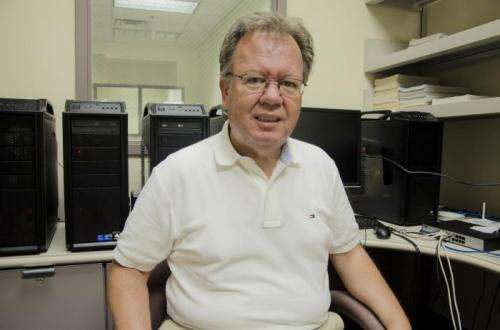Use digital signal processing engineering to prevent a flash crash on Wall Street, prof says

NJIT Associate Professor Ali Akansu, PhD, wants to prevent another flash crash on Wall Street. An electrical and computing engineer who is an expert in the relatively new field of adapting signal processing to strengthen the security of finance markets, he fights to be heard. Among his weapons are frequent talks to colleagues at IEEE events. He believes that by using new technology—like digital signal processing (DSP) engineering—another flash crash, like the one in 2010 that almost destroyed world-wide financial markets, need never happen again.
"There are DSP engineering theory and methods that may help quantitative finance and algorithmic trading so that no one ever sees such a crash again," he said. "Eighty percent or more of exchange trades depend on DSP engineering."
Akansu delivered these insights at a recent IEEE conference on acoustics, speech and signal processing where he presented several papers which he co-authored. The papers included "High Frequency Trading and Signal Processing Models for the Microstructure of Financial Markets," (with Purdue University Professor Ilya Pollak); "A Novel Method to Derive Explicit KLT Kernel for AR (1) Process" (with NJIT doctoral student Mustafa U. Torun); and "FPGA Based Eigen Filtering for Real-Time Portfolio Risk Analysis" (with Torun and NJIT doctoral student Onur Yilmaz).
According to Akansu, recent advances in high performance computing and DSP along with low latency networking and storage technologies have transformed the financial industry. "Signal processing and engineering methods have greatly increased. And along with these changes have come new multi-disciplinary research opportunities in the fields of mathematical finance, DSP engineering, and computing to solve sophisticated and challenging financial problems including risk management, optimal trade scheduling, analysis of financial networks, valuation of complex derivative securities and electronic trading."
At the conference, Akansu also co-organized and chaired a special session with Pollak about financial signal processing and electronic trading. The session which drew three dozen listeners, introduced the essentials of exchanges, market microstructure and high frequency trading. It described recent models of limit order book dynamics and the market impact of order placement and trading. And it detailed some open problems offering engineering insights in these relatively new fields. Akansu also analyzed and explained the 2010 market "flash crash."
"We wanted everyone to understand why this flash crash happened," he said. In the special session, Akansu and Pollak praised the virtues of high performance DSP technologies like FPGA and GPU for real-time portfolio risk measurement and control, and other financial processes.
They introduced a novel method for principal component analysis (PCA), aka Karhunen-Loeve Transform (KLT) and its use in finance applications. Lastly, they stressed the importance of better maintained limit order book made possible by the new technology. "I believe that by using new technology," Akansu said, "we can develop fairer and more robust markets."
Provided by New Jersey Institute of Technology


















